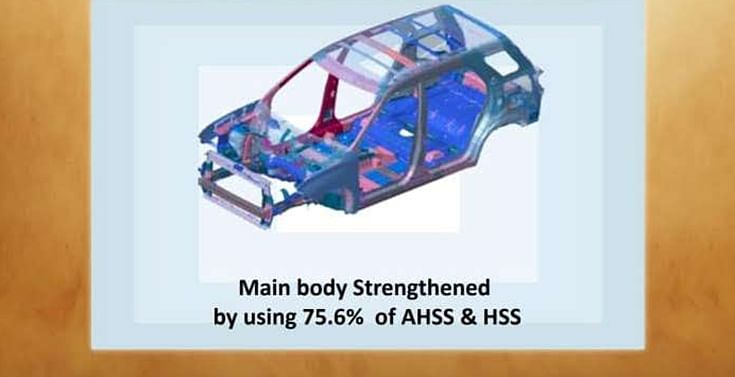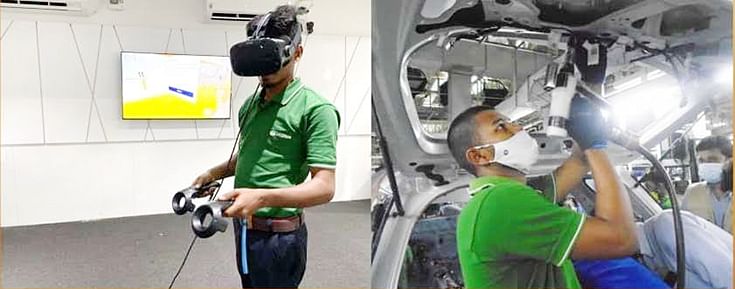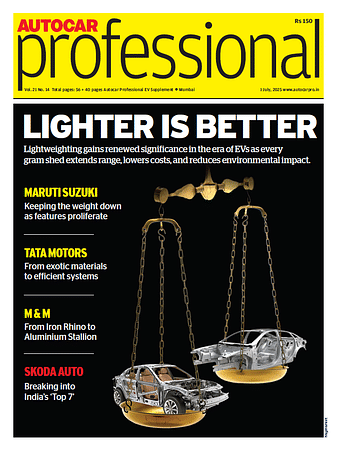Hyundai reveals Alcazar premium SUV
Korean carmaker takes wraps off the Creta-based six-and-seven seat SUV that goes on sale later this quarter.
Hyundai Motor India remains strongly bullish on the SUV segment. The carmaker which registered a smart uptick in the UV segment in FY2021 with products including the new Creta and Venue, is gunning for more growth in the category. It is now revealed its latest salvo at India's booming SUV market: the Alcazar.
The seven-seat SUV which will also be offered in a six-seat configuration will go head to head with competing products such as the MG Hector Plus, Maruti Suzuki XL6 and the recently launched Tata Safari.

According to SS Kim, managing director, HMIL, "When the Creta was introduced six years ago, it created a new segment and set a benchmark. While the Alcazar (6-7 seat) segment is not that big, we still believe the product will grow the overall market demand in this category."
According to Tarun Garg, director, sales, marketing and aftersales, HMIL, "What we have seen in the six-seat SUV category is the lifestyle trend of the customer, wherein not all seats might always be occupied, but it is rather about having the practicality and usable space."
"Moreover, the concept of friends coming together and going for expeditions is throwing up demand for such vehicles. Also, existing owners of Creta and Verna want to upgrade to a bigger vehicle within the Hyundai family."
The czar
The Hyundai Alcazar is based on the Hyundai Creta which is currently the top-selling SUV in India. The second-generation Creta was introduced in March 2020, and has sold 121,000 units in a span of one year, being the driver of catapulting Hyundai's UV market share to a substantial 21 percent in FY2021.

The company claims that the Alcazar is made up of 75.6 percent advanced high-strength steel (AHSS) and high-strength steel (HSS) in its body she'll construction, along with the hot-stamped panels undergoing an advanced welding process to produce a robust body-in-white (BIW).
While it has a face that resembles the Creta, there are notable changes to the grille and bumper design. The side profile too boasts of voluminous wheel arches that house the 18-inch diamond-cut rims, as well a strong character line running across the length of the car. The wheelbase at 2,760mm is 150mm more than the Creta.
To accommodate the third row of seating, the door opening aperture at the rear has been further optmised, while the last row of seats allow a recline function. The second row, on the other hand, is slidable and reclinable in the six-seat version, along with having a separate centre console to offer additional storage space.
Heart of the matter
The Alcazar will come powered by a 2.0-litre Nu-series, third-generation naturally-aspirated petrol engine that delivers 157bhp or Hyundai-Kia Group's ubiquitous U2 1.5-litre, four-cylinder, 113bhp diesel motor. Both BS VI-compliant engines will come mated to either a 6MT or 6AT gearbox options. Although there's no all-wheel-drive system on offer, both engine options will offer Eco, City and Sport driving modes.
HMIL believes that people have started giving preference to petrol over the last couple of years, which is also being increasingly seen in the SUV segment.
Hyundai Motor India claims to have conducted a testing procedure of over 400,000 kilometres through the various terrains and geographies of India.
Some salient mechatronic features include an electric control variable oil pump in the 2.0-litre unit that aids efficiency by lowering the engine's power consumed by the pump.
In terms of NVH, the company has implemented structural adhesives, foam add-ons in the BIW, and drive shaft dampers for reducing noise during acceleration.

High-tech manufacturing
Hyundai revealed that it adopted advanced software technologies such as Digital Twin for pre-assembly design assessment, line layout and robot installation. High-end industry 4.0 feedback systems have also been deployed at its Chennai plant in operations such as welding and brazing to ensure quality and 100 percent dimensional accuracy in the end product.
The company also employed over a hundred data scientists to tap into the data from the 2,430 connected machines, 1,040 sensors and 105 self-learning machines. Even its shopfloor is claimed to be fully-IoT enabled.
For traceability, Hyundai Group's Global Part Traceability Information System (GPTIS) is claimed to ensure component traceability across vendors and markets. Furthermore, the company leveraged virtual reality (VR) tools to deliver skill to its assembly manpower.
The company continues to witness surging demand for SUVs and is ramping up production at its plant. After the lockdown of April 2020, Hyundai Motor India was able to resume operations in May, manufacturing only 200 units per day, to reaching 42,000 units in July to eventually reaching 71,178 units by December 2020 – its highest ever production miles
RELATED ARTICLES
JSW MG Motor India confident of selling 1,000 M9 electric MPVs in first year
The 5.2-metre-long, seven-seater luxury electric MPV, which will be locally assembled at the Halol plant in Gujarat, wil...
Modern Automotives targets 25% CAGR in forged components by FY2031, diversifies into e-3Ws
The Tier-1 component supplier of forged components such as connecting rods, crankshafts, tie-rods, and fork bridges to l...
VinFast’s second plant in Vietnam goes on stream ahead of India factory
Vietnamese EV maker’s second plant in its home market, which has a 200,000 EVs-per-annum capacity, will focus on produci...





 08 Apr 2021
08 Apr 2021
 15262 Views
15262 Views








 Autocar Professional Bureau
Autocar Professional Bureau




